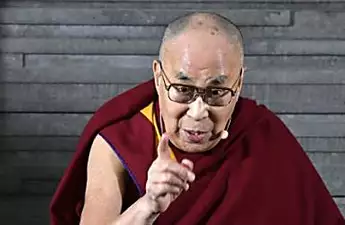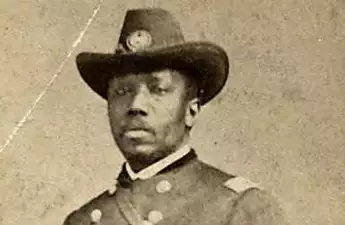
LAREDO (UNITED STATES) -
It's busy, as usual, at the Holding Institute migrant shelter in the southwestern Texan border city of Laredo. Young African kids tear around the courtyard as their exhausted parents look on.
The 34 people staying here have made it to the United States after journeys from the Democratic Republic of Congo and Angola.
"It was very dangerous," one man tells us at France24 in halting French as he outlines his travels from Angola to Cuba, on to Brazil, then up through Central America and towards the US.
The journey took many weeks. "Very hard," he says.
This group says they are fleeing violence and political oppression at home -- but now face an uncertain future in the US where critics accuse the Trump administration of creating an increasingly hostile environment for refugees.
On November 9, Trump issued a proclamation saying only those who enter the US at official checkpoints -- as opposed to sneaking across the border -- can apply for asylum.
A federal judge has temporarily blocked the order, but Trump has vowed to take the matter to the Supreme Court, even though US law states anyone arriving in America may seek asylum regardless of where they entered.
The president believes migrants are exploiting America's asylum laws and using them to emigrate to the US illegally.
He cited a "massive increase in fear-of-persecution or torture claims" among immigrants as leading to a backlog of asylum cases, which can take years to fully adjudicate.
"During that time, many released aliens fail to appear for hearings, do not comply with subsequent orders of removal, or are difficult to locate and remove," Trump said in his proclamation.
- 'Political gesture' -
Though the people at the Holding Institute all claimed asylum at the point of entry at Laredo, Mike Smith, a Methodist pastor who runs the shelter, said he frequently helps asylum seekers who have crossed illegally.
One of the justifications the Trump administration has used for putting up miles of barbed- and concertina-wire fences in places like Laredo is to corral migrants towards legal points of entry.
Hundreds of people try to cross into the area around Laredo each day, and Smith sees no let up in the numbers. If anything, they are increasing.
Trump's order is "purely a political gesture with no real teeth," he told us at France24 in an interview at the shelter this week.
The fence and Trump's asylum order won't make a difference to the numbers of migrants, Smith said.
They are "more of an emotional red flag to people who would want to cross legally or illegally, asylum seekers, refugees to show that this place is not welcoming."
Human rights campaigners and other critics of the Trump crackdown say that by restricting asylum seekers to border crossing points -- which are already under enormous pressure -- the government is effectively shutting the door on people who may truly be fleeing for their lives.
In 2018, border patrols registered more than 400,000 illegal border crossers, according to the Department of Homeland Security. And in the last five years, the number of those requesting asylum has increased by 2,000 percent, it said.
Less than 10 percent of cases result in asylum being granted, the government says.
- Donations -
For the asylum seekers from Africa, the Holding Institute offers a welcome resting place, safety, shelter and warmth as cold weather sets in.
The facility relies entirely on donations and, even though it is the only such shelter in the city providing housing, gets no money from the government.
It has three staff workers and six volunteers, with a total annual operating budget of $140,000.
One volunteer could be seen helping a young Angolan man look for a cheap bus fare to Portland, Maine, where he will head for his initial asylum hearing.
Smith says he relies on community support and is always looking for donations of diapers, hygiene products such as soap and shampoo and wipes.









![[Pics] Disturbing Crimes Committed In Professional Sports History [Pics] Disturbing Crimes Committed In Professional Sports History](https://images.outbrainimg.com/transform/v3/eyJpdSI6ImY0NjUwMTlmN2I4NTllMTc3ODBkY2NhMmI3YzhhMTc5MTQ4NzE0NTlhZGQxMTNlZWUxNDdhNTZmMDZhNWVmMDIiLCJ3IjoyMzAsImgiOjE1MCwiZCI6MS41LCJjcyI6MCwiZiI6MH0.webp)




![[Pics] 'Evidence of life on Mars' found in NASA Spirit rover Stunning images. [Pics] 'Evidence of life on Mars' found in NASA Spirit rover Stunning images.](https://images.outbrainimg.com/transform/v3/eyJpdSI6ImQ3ZjY2ZmI0Nzk4OTg3NTA5MTA4MzYzMTc0ZWJlNTI2NzAwMWI3MmNhNzkyOGUwOTA4OTgxN2UxY2FhZjIxMjYiLCJ3IjoyMzAsImgiOjE1MCwiZCI6MS41LCJjcyI6MCwiZiI6MH0.webp)
![[Gallery] Things Flight Attendants Notice About Passengers In 3 Seconds [Gallery] Things Flight Attendants Notice About Passengers In 3 Seconds](https://images.outbrainimg.com/transform/v3/eyJpdSI6ImJlNjg4OGE5MjhjNzY1MzYwZTMxYTI5MzNhZjg3OTRhMzIyYzhiODZlN2M2YjMxN2M4YWE0Njc0MGE1OGI1OTkiLCJ3IjoyMzAsImgiOjE1MCwiZCI6MS41LCJjcyI6MCwiZiI6MH0.webp)






No comments:
Post a Comment